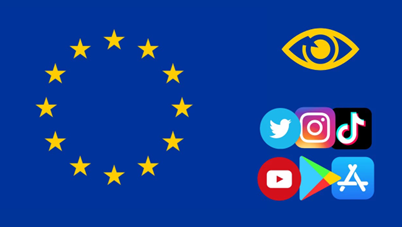
Revolutionary EU Law Comes into Force: Millionaire Fines Stalk Internet Giants
Since Friday, an ambitious new chapter in the Law Digital Regulation Act has taken the stage in the European Union (EU), leaving the titans of the Internet in a position of fragility. The top 19 social networks, online commerce platforms and search engines, including names such as Google, YouTube, Amazon, Facebook, Instagram, X (formerly known as Twitter) and TikTok, are expected to meet stringent demands or face penalties that could severely impact their operations.
Digital Services Act: The Awakening of a New Control
The shocking Digital Services Act (LSD) has begun to exert its influence on these large tech corporations. With more than 45 million active users each in the EU, these companies must now face renewed responsibilities in the fight against the proliferation of illicit content and opacity in their operations. Disinformation, online hatred, child pornography and fakes are in the crosshairs of the European Commission, which remains vigilant about its actions.

The Transformation of the Digital Landscape
Thierry Breton, the European Commissioner for the Internal Market, has pointed to this moment as a revolution in online jurisdiction. Tech platforms are no longer allowed to operate under their own rules and in an environment of “favored treatment.” Instead, they are now regulated entities, under scrutiny similar to that faced by financial institutions. This forceful measure aims to ensure that companies comply with the new LSD guidelines.
The Implications of Non-Compliance
The warning is clear: those who disobey risk fines that could loom at 6% of their global revenue and, in more serious and persistent cases, could face a temporary ban on operating in the EU. A stark reminder that non-compliance carries considerable financial consequences.

New Tools of Struggle and Transparency
To comply with the new legislation, platforms must provide users with a tool that allows them to easily report illegal content under national and European laws, with the obligation to remove it expeditiously. In addition, they will be subject to annual independent audits to ensure proper compliance with their responsibilities.
Unlocking the Secrets of Algorithms
The magnifying glass has also been directed towards the algorithms that drive these platforms. They are now required to explain in detail how their recommender systems work, and provide options without customization. This movement seeks to curb the potentially harmful impact of algorithmic recommendations.
Restricted Advertising and Ongoing Changes
Advertising also undergoes significant changes under LSD. That directed to minors and based on sensitive data, such as religion or sexual orientation, is prohibited. Several of the giants have already announced adjustments to comply with these rules before the deadline. TikTok, for example, now allows users to turn off personalized recommendations, while Meta, the parent company of Facebook and Instagram, has hired additional staff for LSD implementation.

Looking to the Future: Behind-the-Scenes Changes
Although many of the changes resulting from this legislation will not be immediately visible to users, they represent a drastic change in the way these companies operate. With a dedicated team overseeing LSD implementation, the EU is determined to keep the internet giants at bay, ensuring a safer and more transparent internet.
For more content like this, click here.









